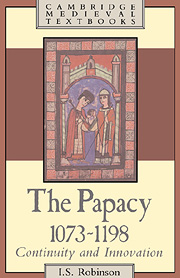Book contents
11 - Papacy and empire
Published online by Cambridge University Press: 05 June 2012
Summary
THE INVESTITURE CONTEST
Four months after his accession Pope Gregory VII wrote to the powerful German prince, Rudolf of Rheinfelden, duke of Swabia and kinsman by marriage of King Henry IV, about the means
by which the empire is ruled more gloriously and the strength of holy Church is confirmed: namely, that priesthood and empire are joined in the unity of harmony. For just as by means of two eyes the human body is ruled by temporal light, so by means of these two dignities, agreeing in pure religion, the body of the Church proves to be ruled and illuminated by spiritual light.
This idea was drawn from the most influential of early medieval statements of the relations of empire and papacy, the writings of Pope Gelasius I (492–6). ‘The world is chiefly governed by these two: the sacred authority of pontiffs and the royal power.’ ‘Christ … separated the offices of both powers according to their proper activities and their special dignities.’ The emperor's office is to ‘rule over the human race in dignity’; but he must ‘devoutly bow the neck to those who are placed in charge of religious matters and seek from them the means of [his] salvation’. Papacy and empire were a divinely ordained duality, governing the Christian people side by side, each with a distinct function but dependent on the other, ‘so that Christian emperors need pontiffs in order to attain eternal life and pontiffs have recourse to imperial direction in the conduct of temporal affairs’.
- Type
- Chapter
- Information
- The Papacy, 1073–1198Continuity and Innovation, pp. 398 - 524Publisher: Cambridge University PressPrint publication year: 1990



